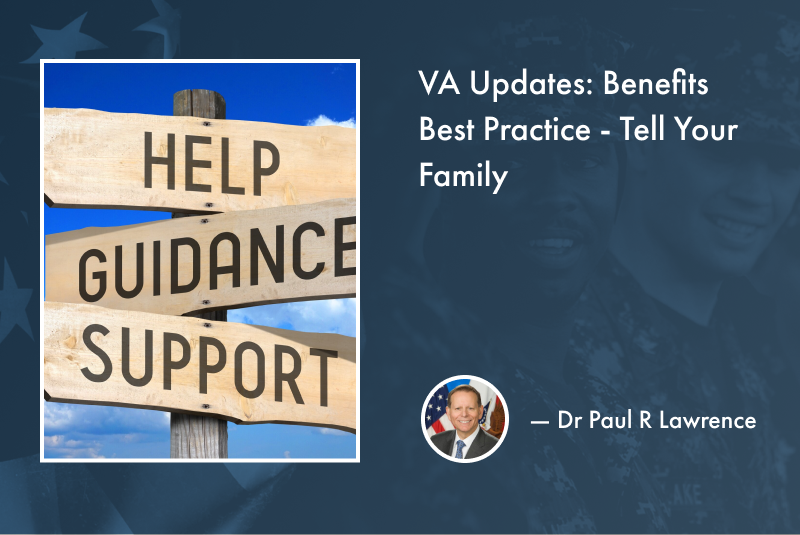Six million Veterans receive benefits from the U.S. Department of Veterans Affairs (VA). As I described in a previous column, these are earned benefits for military service and not entitlements.
For Veterans, it is essential to explain to your family members what these benefits are, how they are administered, and how they would be affected if you should pass. Based on an all too common real-world situation, this example summarizes why taking the time to speak to your family about your benefits is critical.

Scenario One: Veteran Does Not Share Benefit Information with Family
Consider a married male Veteran who has not shared his benefit information with his spouse. He qualified for disability compensation for a service-related injury and receives a tax-free payment of $2,500 every month. These funds are incorporated into the family budget, which he and his wife use to pay for living expenses.
The Veteran dies, and his wife begins grieving. During this challenging period, she notices the $2,500 monthly payment he received from the VA has stopped. This results in a shortfall in their budget, causing additional stress.
Ultimately, she realizes she must connect with the VA to learn more. As she works her way through the bureaucracy, she struggles to understand benefits in general while finding out what her husband was receiving. Finally, she encounters information and forms for survivor benefits. This can be overwhelming during the best of times, but during this period of personal loss, it can add more stress.
Widows facing this situation are often approached by agents who offer to help them with VA benefits in return for a payment. Facing what seems like an insurmountable situation, some agree, even though no-cost support is available.
Scenario One Bottom Line – lack of understanding can cause additional stress during a difficult period and can provide an opening for unnecessarily paying for services.

Scenario Two: Veteran Carefully Explains His Benefit Information with Family
Much like the Veteran in the first scenario, this married Veteran receives $2,500 per month for disability compensation, which is used in their monthly budget for living expenses.
Unlike the other Veteran, this Veteran explains the benefits he is receiving from the VA. He has carefully stored all the documentation related to his service, the application for benefits, and the decision letters describing his service connection. He shares that information with his wife.
They discuss the financial implications of his passing. The $2,500 monthly payment will stop, and a smaller survivor benefit payment may be initiated. This will result in a shortfall in their budget. To address the need for additional income when the Veteran passes, they purchase sufficient life insurance to cover the reduction from decreased benefit payments.
Finally, the Veteran introduces his wife to the Veteran Service Officer (VSO) who helped him with his disability compensation claim, pointing out that he will be able to assist her at no cost should something happen to him. The VSO explains survivor benefits to the wife, identifying needed information and timing.
The Veteran passes, and the wife grieves. When the payment from the VA stops, her monthly budget is not reduced as the payment from life insurance purchased earlier now makes up the difference.
Instead of struggling through the VA system, the wife contacts the VSO, who assists her in completing forms for the appropriate survivor benefits and answering her questions. When approached by those who offer to help her with a payment, she simply says, “No, thank you.”
Scenario Two Bottom Line – by taking the time to explain and plan, additional stress is minimized, and the opportunity to pay for unneeded services is avoided.
For various reasons, end-of-life planning is put off by many. As you can see from these simple examples, taking the time to explain your VA benefits to family members can reduce stress during a difficult period. Consider this as you complete your New Year’s resolution list.
About the Author Paul R. Lawrence
Paul R. Lawrence, Ph.D., served as Under Secretary of Benefits at the U.S. Department of Veterans Affairs from May 2018 to January 2021. He is the author of “Veterans Benefits for You: Get what You Deserve,” available from Amazon.

Read About Other VA Updates
If you enjoyed learning about the importance of sharing Veterans benefits with family valuable, we invite you to read the stories of VA Updates on our blog. In addition to our profiles of celebrities who served, we share military book reviews, veterans’ service reflections, famous military units and more on the TogetherWeServed.com blog. If you are a veteran, find your military buddies, view historic boot camp photos, build a printable military service plaque, and more on TogetherWeServed.com today.
.

0 Comments